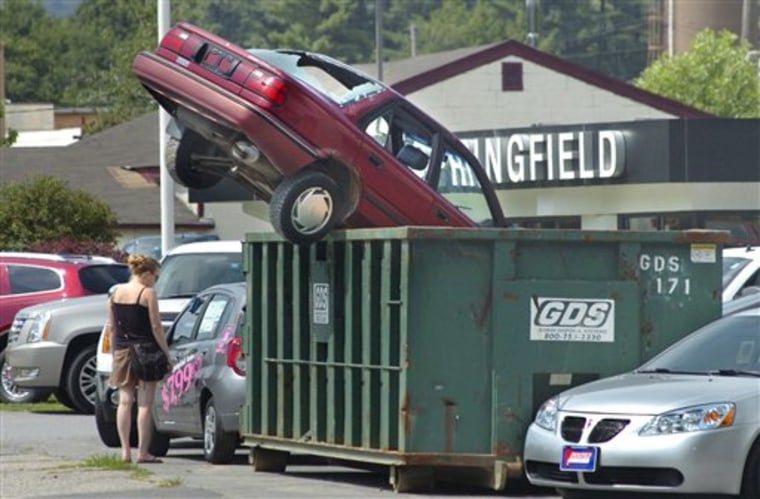The House voted overwhelmingly Friday to rush $2 billion into the popular but financially strapped "cash for clunkers" car purchase program, heeding calls from consumers eager to keep taking advantage of thousands of dollars in trade-in incentives.
House members approved the measure 316-109 within hours of learning from Transportation Secretary Ray LaHood that the program was running out of money.
President Barack Obama said he was encouraged by the House action to keep alive a program that had "succeeded well beyond our expectations." Senate action is likely next week, ensuring the program won' be affected by the sudden shortage of cash.
Rep. Steve Israel, D-N.Y., said of the program: "This is a test drive, and people bought it big time."
Called the Car Allowance Rebate System, or CARS, the program is designed to help the economy and the environment by spurring new car sales. Car owners can receive federal subsidies of up to $4,500 for trading in their old cars for new ones that achieve significantly higher gas mileage.
House Majority Leader Steny Hoyer said the new money for the program would come from funds approved earlier in the year as part of an economic stimulus bill.
House Speaker Nancy Pelosi, D-Calif., said the cars purchased under the program were much more fuel-efficient than the bill requires.
"Consumers have spoken with their wallets, and they've said they like this program," said Rep. David Obey, D-Wis.
Some Republicans argued that Democrats were trying to jam the legislation through. A number of lawmakers also complained that many dealers have been left to contend with a chaotic government-run program.
"The federal government can't process a simple rebate. I've got dealers who have submitted the paperwork three times and have gotten three rejections," said Rep. Pete Hoekstra, R-Mich. "What is a dealer supposed to do?"
There had been a $1 billion budget for rebates for new car sales in the program that was officially launched last week and has been heavily publicized by automakers and dealers.
The program offers owners of old cars and trucks $3,500 or $4,500 toward new, more fuel-efficient vehicles, in exchange for scrapping their old vehicles.
In the Senate, Dianne Feinstein, D-Calif., had proposed a plan that would have required the new vehicles to be vastly more fuel-efficient. When Feinstein supported the $1 billion funding plan in June, she said she received "absolute assurance" from Senate leaders that if the program continued beyond November it would be modeled after her bill.
Feinstein and Sen. Susan Collins, R-Maine, asked the Transportation Department Friday for more details on how the program has worked. "Congress needs this data in order to determine if the fleet modernization program delivered significant fuel economy gains and oil savings," Feinstein and Collins wrote.
Sen. Carl Levin, D-Mich., said the administration assured lawmakers that "deals will be honored until otherwise noted by the White House." But he suggested that "people ought to get in and buy their cars."
At the White House, press secretary Robert Gibbs sought to assure consumers that the program was still running and would be alive "this weekend. If you were planning on going to buy a car this weekend, using this program, this program continues to run."
It was unclear how many cars had been sold under the program.
Sen. Debbie Stabenow, D-Mich., said about 40,000 vehicle sales had been completed through the program but dealers estimated they were trying to complete transactions on another 200,000 vehicles.
John McEleney, chairman of the National Automobile Dealers Association, said many dealers have been confused about whether the program will be extended and for how long. Many had stopped offering the deals Thursday after word came out that the funds available for refunds had been exhausted.
The clunkers program was set up to boost U.S. auto sales and help struggling automakers through the worst sales slump in more than a quarter-century. Sales for the first half of the year were down 35 percent from the same period in 2008, and analysts are predicting only a modest recovery in the second half.
With so much uncertainty surrounding the program, North Palm Beach, Fla., dealer Earl Stewart said he planned to continue to sell cars under the program but would delay delivering the new vehicles and scrapping the trade-ins.
"It's been a total panic with my customers and my sales staff. We are running in one direction and then we are running in another direction," he said.
